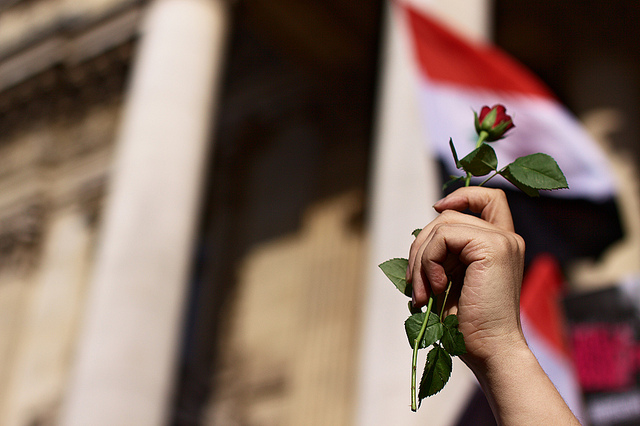Please support our coverage of democratic movements and become a monthly supporter of rabble.ca.
I never liked the term “Arab Spring”; it has a connotation of over-optimism that can’t be rationally understood in a region that painfully emerged out of French and British colonialism to quickly fall into a new era of cultural and economic colonialism where foreign soldiers were replaced by TV satellite dishes, Coca-Cola and Star Academy-like shows.
In Tunisia, my home country, the “Arab Spring” was referred to by another exotic-sounding (and misleading) term called the “Jasmine Revolution.” I never liked this appellation because it dismisses all the tears, blood and sacrifices of political opponents and activists that stood up for many years against tyranny, dictatorship and absolutism.
However, beyond our likes or dislikes of the terminology and the vocabulary and the choice of words, one has to admit that today’s situation in the Middle East and North Africa (MENA) is, to say the least, very troubling.
I was very excited in 2010, when I heard the news that Tunisian ex-president Zine al-Abidine Ben Ali, who ruled as a dictator for 23 years, escaped like a frightened rat to the Kingdom of Saudi Arabia. My excitement was even high after the reluctant departure of Hosni Mubarak from the presidency of Egypt under the persistence of street protesters. When I saw the horrifying capture of Gaddafi and his killing by rebels, I wasn’t so happy though. I wished he was put in prison and judged by an independent tribunal for all the crimes he committed. My Libyan friends had different opinions. They told me that Gaddafi deserved such an end, and that if he was kept alive he would get away with the brutalities committed under his 40 years of reign. I was not convinced and I kept repeating that no matter what crimes are being ascribed to someone, this person needs to be judged and given the opportunity of a due process. The same uneasy feelings penetrated my body when I saw the repulsive images of Saddam Hussein being hanged in 2006 on the day of the Eid when Muslims usually slaughter lambs to commemorate the sacrifices of Prophet Abraham.
Today, I still hold on to my principles but I feel some cracks shaking me from inside. After the departure of a few tyrants, did real change come to Tunisia, Egypt, Libya, Yemen and Iraq? Corruption is still so widespread, if not overwhelming. Unemployment rates have soared, and became exposed after the fading of the layers of veneer that were well-crafted by tyrants and their accomplices. What is alarming is that brutality and violence have now become daily routines in the streets of Cairo, Benghazi, Sanaa and Aleppo.
What really added to my confusion was the plunge of Syria into civil war. The pictures of thousands of refugees fleeing the conflict, the destruction of thousand of years of culture and civilization and the ongoing inaction of western courtiers came to pull me from my idealistic dreams to confront the sad and complex realities of the region.
Is it possible to have democracy in the Arab world? Is it possibly true that only fierce and ruthless dictators can rule the region as some of my friends keep whispering in my ears? Was “the Arab Spring” a revolution of just a sandstorm in a cup of tea? Aren’t we seeing the return of dictatorship in Egypt, Libya and Yemen, this time with the explicit approval of large classes of society in these countries? Tunisia is somehow still the exception but the precarious political regime there can fall at anytime which has the potential to throw the whole democratic process into uncertainty.
Between 2003 and 2010, MENA experienced two types of regime change: one through foreign military invasion, for instance in Iraq, and the other type through relatively peaceful protests that originated at the grassroots level (even though many questions remain unanswered about some foreign groups financing and training some of the protesters). Today, Iraq is caught more than ever before in a bloody civil war where the victims of yesterday became the tormentors and dictators of today. The Egypt of field marshal Al-Sisi is back to the pre-pan-Arabism revolution of Abdel Nasser, with half the population cheering the return of the military to power and the other half silenced. Libya’s fate is in the hands of Hafter, a Gaddafi-era general, who is branding himself as the one who will clean the country of the terrorists (the same old slogan used by Ben Ali, Mubarak, Salah…). Yemen is back again to tribal wars and in the past three years alone, Bashar al-Assad of Syria committed more horrible crimes than his father Hafez al-Assad did in 40 years of iron-fist rule.
Are security and stability better than democracy? Can’t we have both? At what cost? Despite all the beautiful democratic speeches we hold here in the West, it seems that western countries prefer stability in the MENA or else who would drink the Coca-Cola, watch the American series, or sell Arab oil for cheap? Most importantly, who would pay billions of dollars to buy obsolete, western-made military equipment?
Monia Mazigh was born and raised in Tunisia and immigrated to Canada in 1991. Mazigh was catapulted onto the public stage in 2002 when her husband, Maher Arar, was deported to Syria where he was tortured and held without charge for over a year. She campaigned tirelessly for his release. Mazigh holds a PhD in finance from McGill University. In 2008, she published a memoir, Hope and Despair, about her pursuit of justice, and in 2011, a novel in French, Miroirs et mirages.
Photo: Gwenael Piaser/flickr



